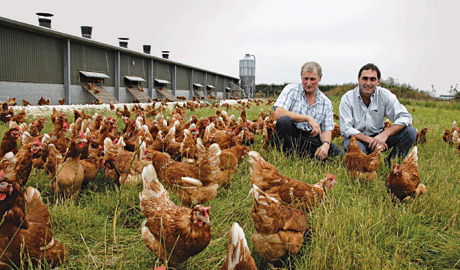Poultry producers show how to manage change

- Howard and Ian Sinkler
- East Yorkshire
By diversifying into free-range egg production in 1999, brothers Howard and Ian Sinkler sparked a chain of events that would eventually lead to the establishment of a successful egg farmer co-op.
The brothers set up their first free-range flock at Manor House Farm, near Beverley in East Yorkshire, to supplement the existing income from 174ha (430 acres) of arable and grassland with 500 head of beef cattle.

Careful research and hard work ensured a successful entry to the industry, with the flock consistently performing to breed targets. In fact, the brothers won Deans Food’s best free-range flock award in the North of England, producing 302.8 eggs to 70 weeks with an average egg weight of 67.67g.
In 2003, Ian added a 16,000-bird house to the original 8000-bird clear span unit, both designed with extreme cleanliness in mind, ensuring dust-free environments and quick, 11-day turnaround times.
He erected a third, 16,000-bird house in 2005, split the same way as the other large house into two 8000-bird units with a central egg store, housing a farmpacker, between them. At its peak, the farm housed 40,000 birds, but stocking rates have now eased a little to 38,450.
Around 18 months ago Ian and Howard sold the beef herd due to soaring feed prices. Howard now oversees the arable enterprise with Ian specialising in the poultry, although they work together during busy harvest times.
Last year, disillusioned by supplying a major packer for ever-dwindling returns, Ian joined forces with another Yorkshire egg producer, Stewart Elliot, to set up EggSell Producers, a new egg marketing co-operative.
“The attempted merger of Deans Foods and Stonegate [the UK’s two largest egg packers] prompted us to think that things were getting a bit big, so we wanted to do something to get a fairer cut back to the producer,” says Ian.
The main aim was to build a new, direct relationship between the farmer and the retailer while reducing food miles.
EggSell is growing rapidly and now has more than 300,000 hens on its books nationwide.
Ian is particularly keen to help newer producers to enter the industry, as he knows it can be a steep learning curve. “What appears to be a very simple animal to rear is in fact very complex, and you need to learn it all in the first two weeks.”
Most of the eggs are sold through packers and into local retailers, to keep food miles down. The co-op has also produced a specialist flock recording programme to aid flock management and last month it launched a new salmonella and avian flu insurance policy to allow producers to protect their businesses from the financial implications of an outbreak.
“If somebody had said five years ago that we’d be doing what we’re doing now, I wouldn’t have believed them,” says Ian. “These are interesting times. The credit crunch will bite, but people have invested huge amounts and need decent returns to continue. Hopefully that’s what EggSell will deliver.”
Five years ago
- Four years into egg productionn
- 24,000 free range layers
- Supplying Deans Food
Now
- 38,450 free raange layers
- Arable enterprise
- A founder of egg co-op EggSell
- Helping new producer enter egg sector
Read how the Allwood family have adapted their business
